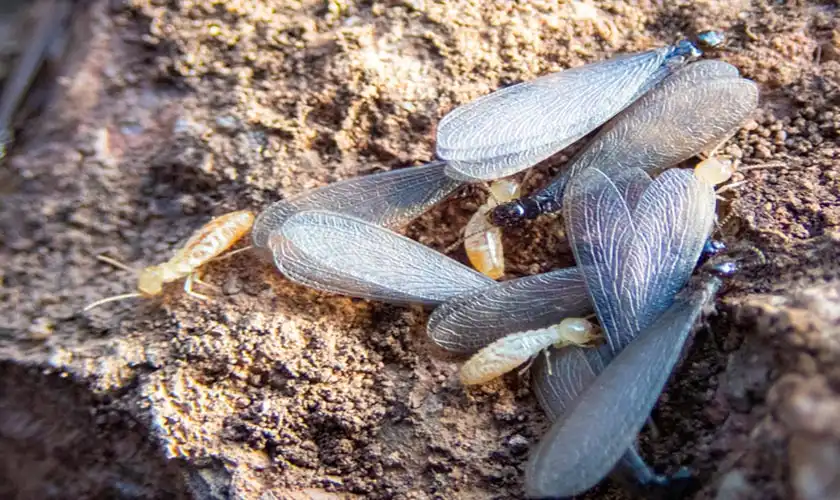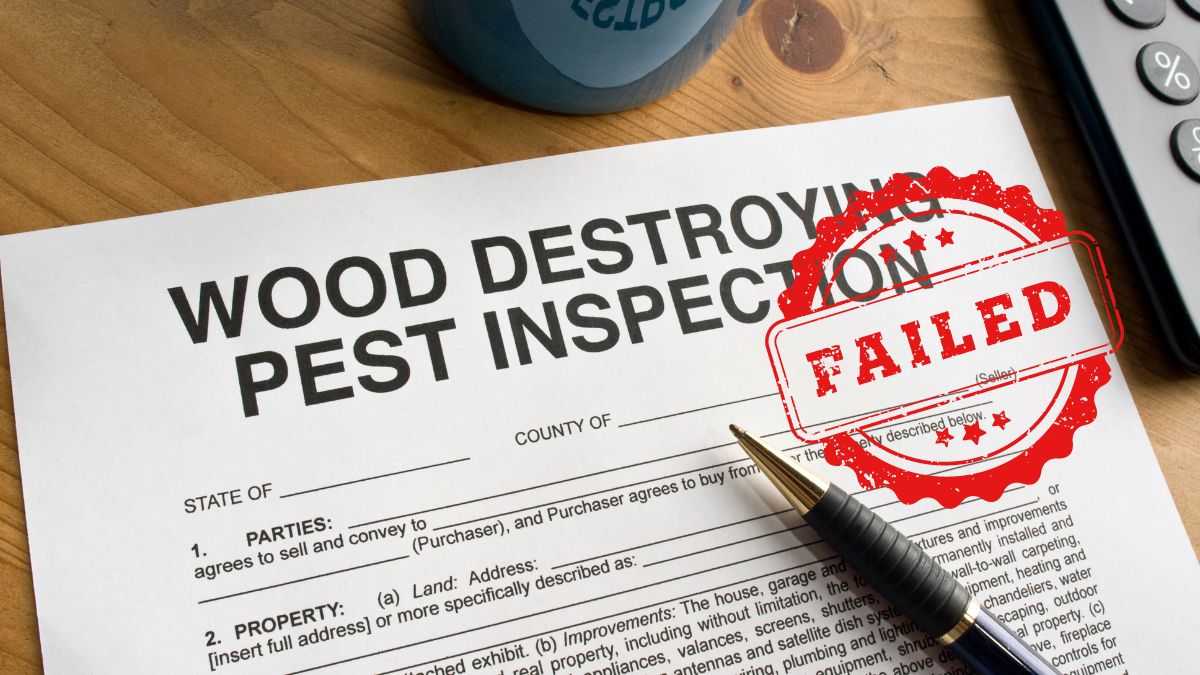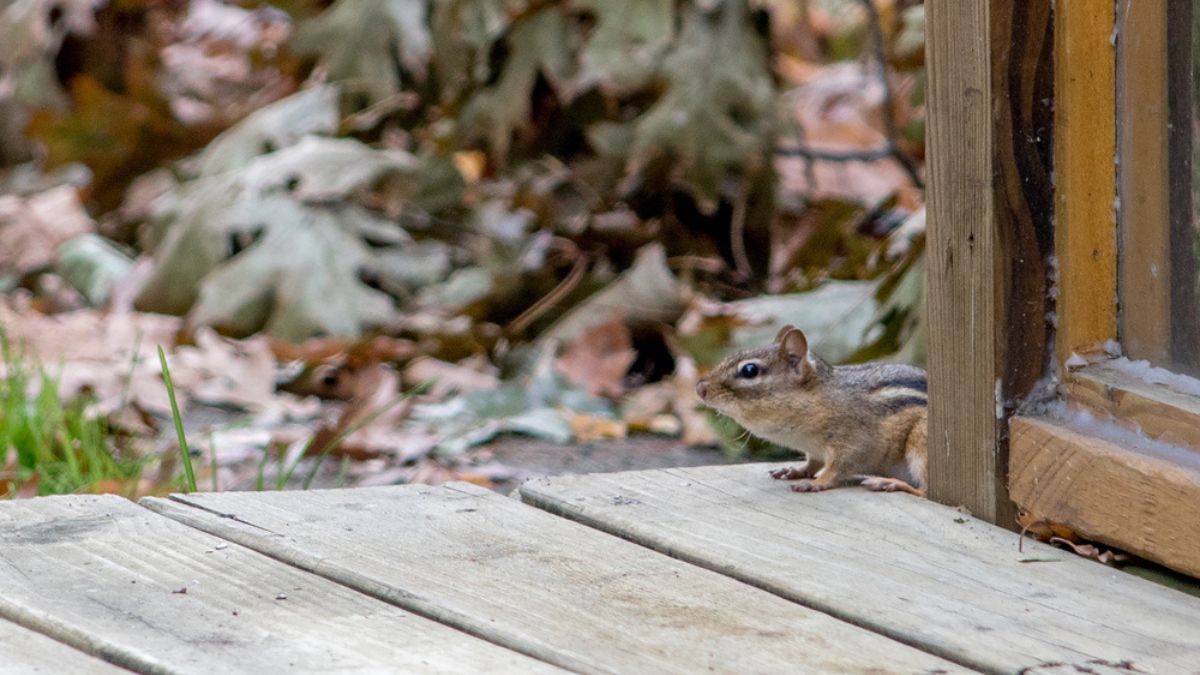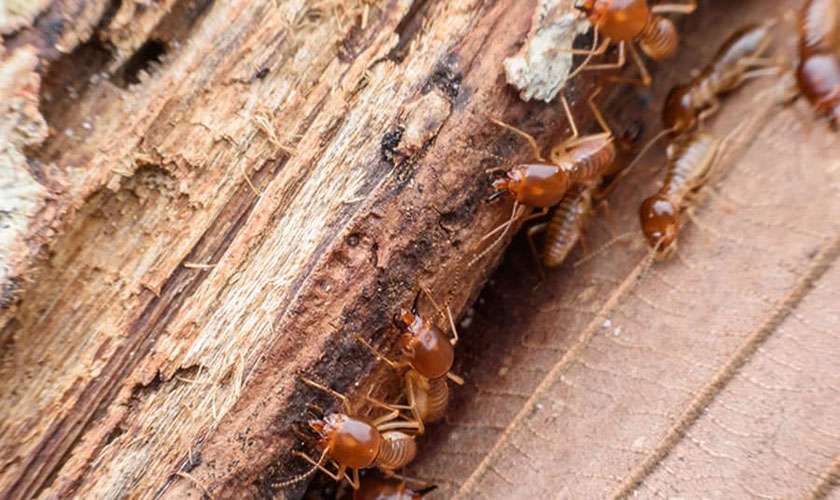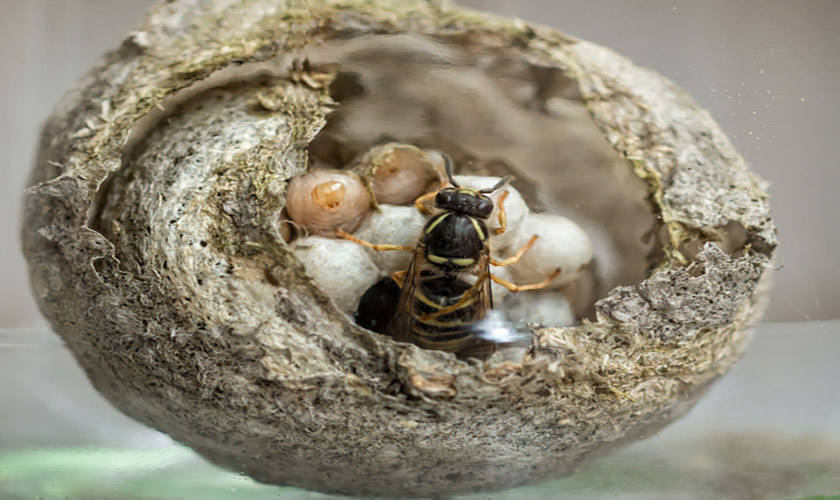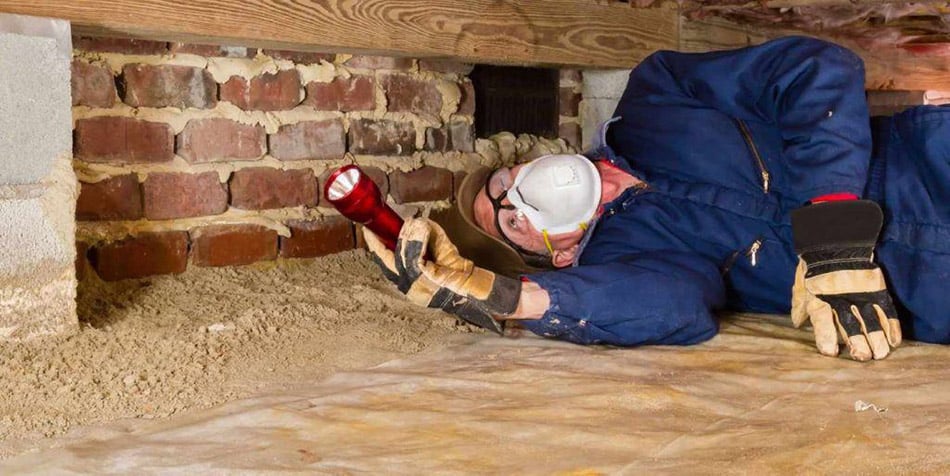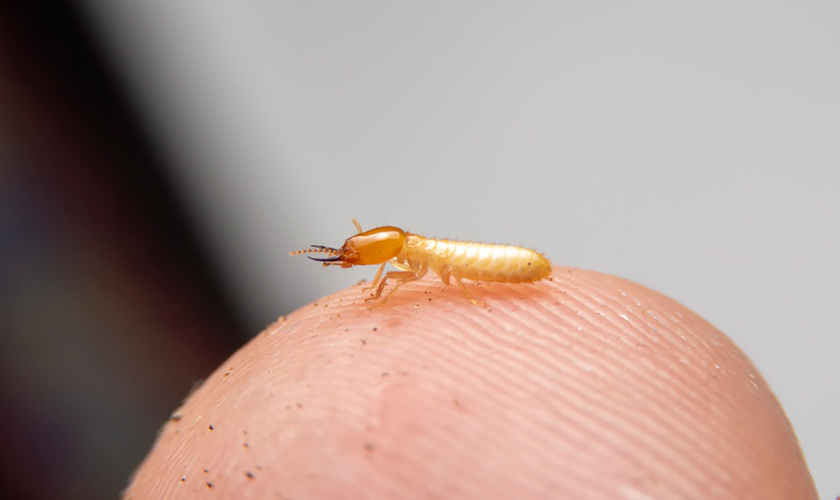
Termites are a huge issue all around the world except in Antarctica. Termite damage can destroy a wooden structure. Each year, nearly 600,000 homes in the United States report termite damage.
If you live in a home with exposed wood or wood siding, you are prone to a termite problem sooner or later. Americans spend an estimated $6 billion annually on termite treatment and preventative services.
Considering how destructive termites can be, you might wonder if termites bite people or pets.
Some termites can bite people and pets, but this is highly unlikely. In most cases, soldier termites have larger mandibles and will only bite you to defend their colony.
If you see a termite, it is likely flying termites (termite swarmers), which can bite but is rare. They are reproductive termites, and their primary job is establishing a new colony. Swarmers live less than 24 hours and don’t have strong mandibles like soldier termites, making them less prone to bite.
Get FREE quotes from licensed pest control technicians in your area today. Whether you need a termite inspection or a full treatment, We Can Help! All technicians are screened, licensed, and insured.
People often confuse a mosquito bite or ant bite for a termite bite because the size, shape, and color are similar. Most termite colonies are underground. Soldier termites stay near the colony to defend their queen. So, unless you disturb a colony, they’re not likely to bite you because you’re not their food source.
As for your pets, they will most likely not encounter termites. Termites also will not cause any harm to you if you do not pester them.
In this article, we discuss a few frequently asked questions that you might have about termite bites. Some of these questions include if termites cause harm to humans or if termites can enter the human body. Continue reading for more.
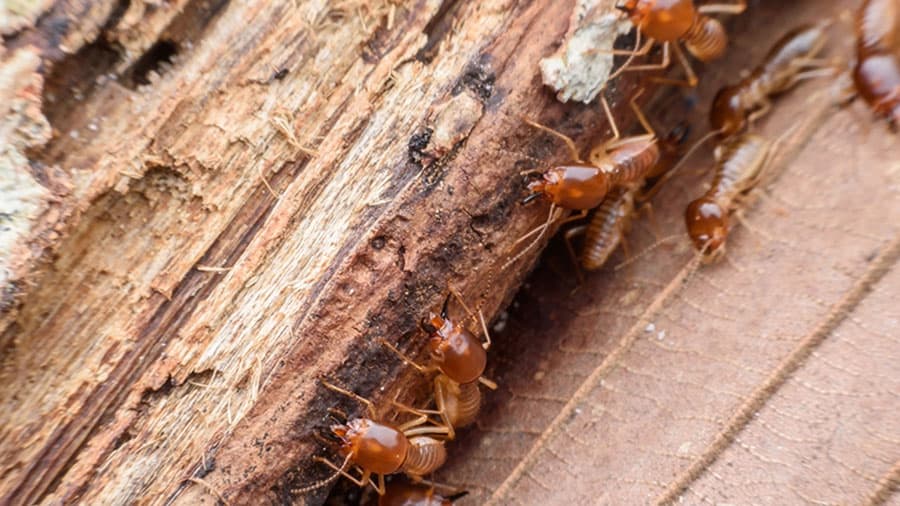
Do Termites Bite People or Pets?
Soldier termites defend their colony mainly from other insects like ants. Unlike parasites who seek blood to eat, termites do not go out of their way to bite people or pets. Termites, also known as white ants, eat wood and other plant-based matter.
Different types of termites include:
- Subterranean termites can be found in every state except Alaska. This species dwells in subterranean colonies or under damp, hidden places aboveground, with a maximum population of 2 million individuals.
- Formosan termites are the most aggressive and devious of over 2,000 termite species recognized in science. They can do extensive damage inside walls and can build intricate colonies.
- Drywood termites infest dry wood and can quickly spread throughout wooden wall supports, roofs, and other structures. Drywood termites can be found up and down the Southern United States, from North Carolina through the Gulf Coast and into California’s coastal regions.
- Dampwood termites attack the wood with high moisture content, primarily in damp areas. Because of the low moisture content of wood in buildings, dampwood termites do not generally infest residential houses. They live on the Pacific coast and adjacent states, the desert or semi-arid southwest, and southern Florida.
Subterranean and Formosan termites require soil contact and set up colonies underground. These are the most common species of termites in the United States and are responsible for the most major damage to wood structures.
In houses, subterranean termites construct mud tubes on foundation walls to travel to and from the colony to the wood food source. Formosan termites live in large subterranean colonies and build intricate mud nests inside buildings’ walls. Formosan termites are tricky to get rid of once they have infested a building.
Other types of termites like conehead, dampwood, and drywood termites can also have colonies inside wooden structures, old tree stumps, or fallen logs.
So, if your child comes across a termite colony and decides to poke and prod it, he might come home with a few bites.
Because the termite colony feels threatened, soldier termites will get defensive and bite fingers, arms, and other areas on your body.
Termite bites pose significant health risks or carry diseases. The main symptoms affect human skin, such as some redness and itching for a few days. Although rare, a termite bite can draw blood, but that’s not the intent of the bite.
So, if you have a termite issue, you should worry about your home’s structure, which is where a professional termite inspection comes into play.
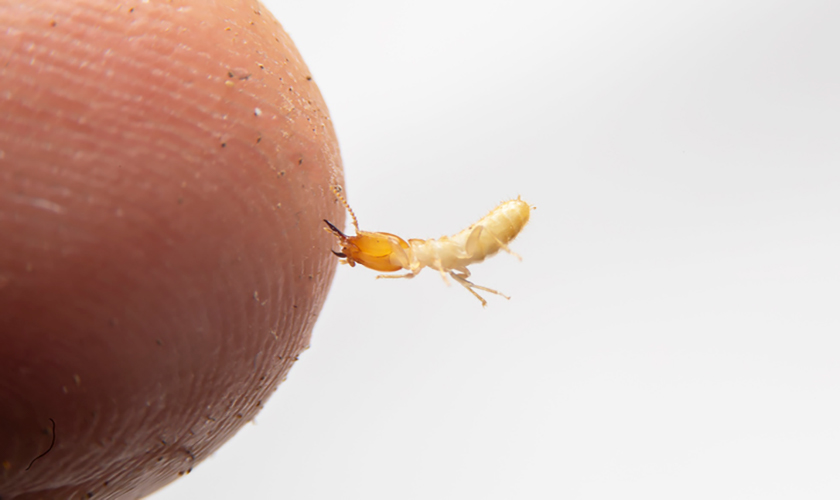
What Do Termite Bites Look Like On Humans?
A termite bite will leave a small, red bump. If you have sensitive skin, the node may rise a bit. However, this part is rare and unlikely to happen.
In most cases, your skin might itch a bit, so you must put anti-itch cream on the affected area until it goes away.
If you find you have a lot of bites, they are likely a different insect. Bed bugs, ants, or other insects are the more likely cause, and it’s a good idea to get the help of a pest control expert.
How Should I Treat a Termite Bite?
A termite bite should not cause any issues. However, if you wish to treat it, you can do the following:
- Wash the affected area off with warm water and soap.
- Apply a cold compress for discomfort.
- Observe the area for any changes, such as pain or swelling.
- Use over-the-counter products like anti-itch cream or pain relievers.
- For a natural remedy, use activated charcoal to help stop the itching.
If you are unsure if it is a termite bite or if the swelling continues after a few days, it might be best to call your doctor.
Seek medical attention immediately if you experience shortness of breath, dizziness, or lightheadedness.
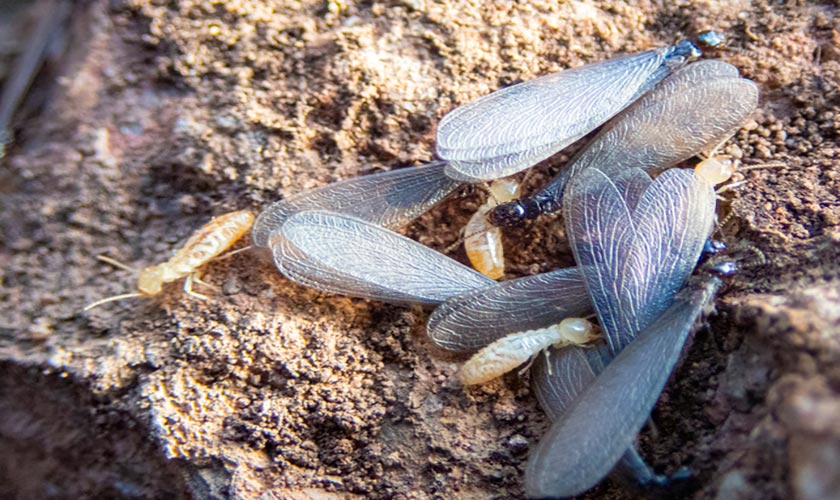
What Do Termites Do to Humans?
It makes sense to be cautious if a termite bite causes damage to your body. Many other insect bites can cause you to go to urgent care or the hospital, depending on the severity of the situation.
However, a considerable threat a termite will do to your health is causing your stress level to go up, harming your financial situation, and creating an unsafe environment due to causing structural damage.
Another threat they might cause is respiratory issues. When white ants build nests within the home, the dust from their nests travels through the overall AC unit.
If you have asthma, you may want to think of relocating at that current given time until the termite infestation within your home gets fixed.
Can Termites Enter the Human Body?
You might cringe at the idea when you hear of a tiny insect that burrows itself under your skin.
Nobody wants something foreign inside of your body, especially bugs. Nevertheless, termites will not enter inside of you. However, if swarmers contact your hair and clothes, they might get on them.
Termites will not eat your hair, but your clothes are a different story. They eat your clothing if you have a stain from food, drinks, or body soil (dead skin flakes).
Do Termites Cause Harm to Humans?
If you ever get a termite bite, it will cause little to no harm to humans. A termite bite feels more like a slight pinch, just like you were getting a taste from a mosquito.
On the other hand, if you get a bite on a sensitive part of your skin, it might hurt more, but it should not worry you. Termite bites will not cause an infection or contract a disease.
Termite bites can also cause a slight burning sensation because of the saliva from their eating habits. Termites eat mainly cellulose obtained from leaves, grass, wood, etc.
However, the red spot, slight pain, or itching will disappear after a few days.
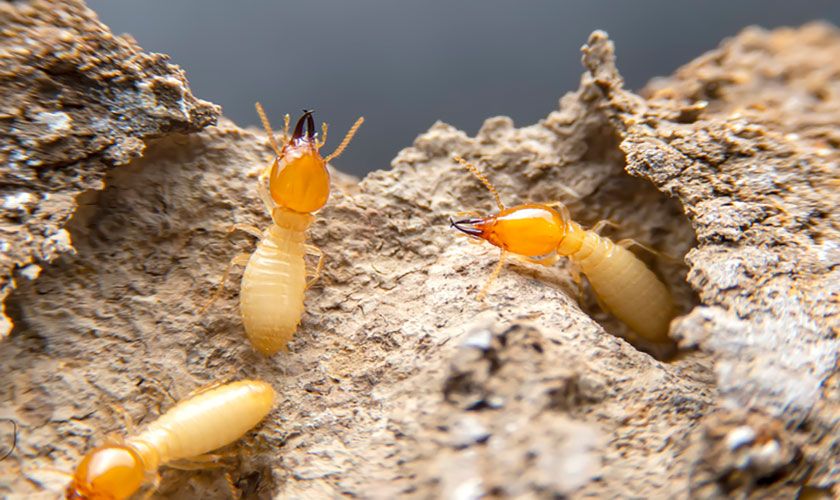
Can Termites Make You Sick?
Termites do not carry any diseases, so it is doubtful they will threaten homeowners.
On the other hand, if you live outside the tristate area, like in Broadbeach Waters, white ants may make you ill, causing allergic reactions or, in severe cases, asthma attacks if your house has an infestation.
Having allergies or asthma attacks will most likely be because your heating and ventilation system spreads dust particles in the air from termite nests. However, this is not a common issue.
Is it Safe to Live in a Home with Termites?
Suppose you are just getting ready for bed and hear a loud crashing sound across the house. Once you check it out, you realize that the home collapsed, which could have been you.
Although this is a difficult situation, you must put the safety of yourself and your family into perspective.
You might be concerned about a few health-related allergies, but if your home’s internal structure is at risk, living in a home infested with termites is unsafe.
What Happens if My Pet Eats a Termite?
Some small insects or food are deadly to your fur babies, so it makes sense to keep them away from it as much as possible.
In the unlikely chance that a dog or cat comes in contact with a termite and winds up eating it, nothing will happen to them.
Conclusion
To bring everything a full circle, termites will not bite humans or pets if they are left alone. If a termite bite does occur, then the bite is relatively easy to treat.
The most common symptom is some short-term discomfort. After a few days, the slight sting or redness will go away. However, If you do experience any health problems, call your doctor.
If you have a pest problem, seek help from a pest control company.
Get FREE quotes from licensed pest control technicians in your area today. Whether you need a termite inspection or a full treatment, We Can Help! All technicians are screened, licensed, and insured.
Other termite content:


